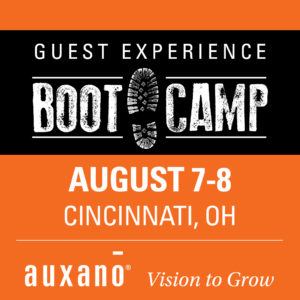
20 Traits of Great Guest Experience Leaders
Editor’s Note: During our August focus on Guest Experiences, we are honored to have some of the best voices in the world of Customer Experience provide guest posts for the Vision Room. As you read the content below, simply think “Guest” in terms of the “customer” the author is talking about – and you will benefit from the knowledge and expertise of some great minds.
Companies that have the strongest customer experiences often have the best leaders. Whether they are individual contributors, executives or customer-facing employees, they know what it takes to motivate and inspire others to create a positive experience. And it shows—customers can tell when an organization is focused on providing a great experience and that attitude is reflected in their people.
Here are the top 20 traits of customer experience leaders:
1. Communication. From emails to in-person conversations and written memos, leaders know how to communicate clearly and powerfully. They get their message across concisely and by using the right channel. Good leaders say what they mean and are as comfortable communicating with customers as they are with executives.
2. Listening. Great leaders listen to people and welcome feedback. They apply what they hear, involve others, and consider what would be best for customers. These skills include listening to comments from both employees and customers to learn what the company can do to create a better experience.
3. Empathy. Leaders have to connect with others. They must put themselves in the shoes of their customers and employees to understand how other people are feeling. It’s about more than just the purchase or the service received—it’s about the emotions that customers feel.
4. Delegation. Customer experience leaders know they can’t do it all on their own, and they share the workload with other people who are qualified to do the job. Great leaders know the skillsets of the people around them and assign tasks to the right people. Delegating involves knowing what needs to get done and providing enough details without micromanaging.
5. Motivation. Great leaders know how to inspire greatness in others and use this to encourage their employees to do their best to serve customers. They encourage each employee in his or her career and help them develop professionally. In order to best motivate employees, a leader must truly know them and help them set and reach their goals.
6. Trustworthy. Employees and customers won’t listen to a leader or give their best effort if they don’t think they can trust them. Leaders need to stand by their word and not get involved in office gossip or politics. Customers and employees should know that a leader won’t back out of a promise or go back on something they said.
7. Humility. Leaders are humble enough to realize that it isn’t all about them. They are willing to sacrifice their time, energy, and resources to make sure other people succeed. Humility can also mean turning to people who are more experienced for a task and focusing more on customers and results than on job titles and salaries.
8. Positivity. It can be easy to get bogged down with negative customers and experiences, but leaders rise above it and share their positive attitude with others. When stressful situations arise, leaders set the tone of positivity and encouragement for everyone around them. They think about the good that can come from a situation instead of jumping to the worst conclusions.
9. Creativity. Leaders think outside the box, especially when it comes to finding the best way to solve customer problems and create a great experience. They are willing to try new things and take risks that could potentially lead to great rewards. Creative leaders know the customers want something different that meets their needs, and they are willing to consider all options to find the right solution.
10. Responsibility. Instead of blaming others when things go wrong or taking all the credit when things go right, leaders win and lose with their team. They take responsibility for failures and make plans of how to improve in the future. Instead of just being the figurehead in charge of a team, they are alongside the employees to get the work done and make sure it is done right.
11. Commitment. Great leaders follow through on their promises to customers and employees and do what they say they will do. They are committed to the mission of the company and do what it takes to succeed. Even when times are difficult, they stand by their employees to ensure that customers are always satisfied.
12. Flexibility. Plans change, and leaders need to be agile enough to make adjustments without being totally thrown off course. This also means understanding human issues and making flexible procedures to meet people’s needs. The best leaders stick to their principles but also know that not everything is black and white and can make changes as needed.
13. Honesty. Transparency is key for leadership. Great leaders don’t keep things from employees and customers. They are honest and open about their actions, motivations, and the state of the company. Is something goes wrong, a leader doesn’t try to hide it or avoid talking about it—they are open and address every situation.
14. Organization. When managing numerous employees and customers, the ability to stay organized is key. Leaders focused on customer experience create efficient processes to get the work done and solve customer issues as quickly as possible. Leaders teach their employees how to stay organized in their work so customers know they can depend on the company to get things done the right way.
15. Strategy. Good leaders don’t fly by the seat of their pants. They have a strategic vision and reason for their actions. They use customer experience to strategically help other areas of the company and know the importance customers play in the overall goals of the company.
16. Approachable. Customers and employees know they can come to a leader with their concerns or questions and that they will be listened to and appreciated. A good leader doesn’t just sit in their office and watch over their employees; they get their hands dirty and get involved with all areas of the work. No job is too small for a good leader, and customers and employees know they can come to them with anything.
17. Innovative. Customers and trends are always changing, and leaders find innovative and new solutions to meet their needs. They are willing to take risks that could pay off with a great customer experience and a competitive advantage. Leaders encourage using new ideas and technology and promote a culture where employees aren’t afraid of failure because it leads to something better.
18. Forward-Thinking. Instead of only thinking of what is happening this month or year, leaders look to the future to prepare their organizations and employees for what is coming next. In customer experience, this means keeping up with trends and incorporating new technology. Leaders don’t wait for customers to tell them what technology they are using. They stay on top of developments so their company can be a leader in a new space.
19. Caring. For customer experience leaders, it’s about more than just the money—it’s about caring for people and helping make their lives easier and better. Leaders know the importance of helping customers through difficult times and encourage their employees to go the extra mile to help customers. They are less concerned about sticking to the letter of the law and more concerned about solving customer needs.
20. Decision-Making. Nothing will happen without a smart leader who is willing to pull the trigger, make tough decisions, and get things done. Leaders are smart and decisive. They know that business moves fast and in order to keep up, they have to make quick decisions.
Learn more about your developing Guest Experience leaders – start a conversation with Guest Experience Navigator Bob Adams.
Want to learn how to create an EXCEPTIONAL Guest Experience at your church? Check out Auxano’s Guest Experience Boot Camp in Cincinnati, OH on August 7-8.


Tags: Blake Morgan, Church Guest Experiences, Guest Experience, Guest Experience Boot Camp, Leadership Characteristics












